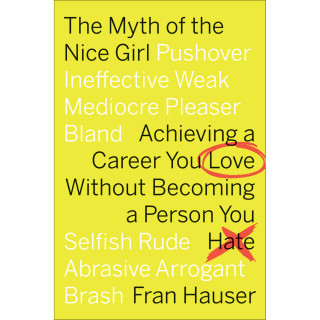What to Say Instead of "I'm Sorry"
The author of The Myth of the Nice Girl on how to avoid undermining what you're really trying to say—and strategies for speaking up with confidence.

Photo: MangoStar_Studio/iStock
One thing that women do too often to avoid coming across as bitchy or rude is apologize—even when we have done nothing wrong. You are probably already familiar with this phenomenon. Have you ever found yourself apologizing when someone else bumps into you? Or have you ever gotten the wrong meal at a restaurant and apologized profusely to the waiter for sending it back? The journal Psychological Science published a study that showed women do indeed apologize more frequently than men. Unfortunately, when we do this at work, it can cause us to seem like pushovers.
When I realized that I was apologizing too much at work, I was determined to break this habit. I started by searching my sent emails for all mentions of "sorry" to get a better sense of when, how, and to whom I had been apologizing without realizing it. I soon found that I'd apologized for all sorts of things, like waiting more than a day to respond to an email: "Hi John, I'm sorry it's taken me so long to respond..." or that I wasn't available to meet at the time a colleague suggested: "I'm so sorry, I won't be available then, but how about..."
Reading these emails, it was so clear to me that I had accidentally been putting myself in a weak position by apologizing for these trivial things. Why was I implying that I was responsible for responding to the email immediately, or that I was expected to work around the other person's schedule? Without realizing it, I had been making myself seem subservient. From that point on, I started rereading all of my emails before sending them specifically to make sure they didn't include unnecessary apologies. I also downloaded the brilliant "Just Not Sorry" Gmail plugin, a Google Chrome extension that highlights phrases in your emails that may be undermining the real message you want to send.
It was also helpful for me to replace my automatic "sorry" with something else. When I sat down and thought about what I was actually trying to convey with the word "sorry," I realized that what I really wanted to communicate was my gratitude and appreciation for the other person's time. So I started replacing, "I'm sorry," with, "Thank you." It's a simple tweak, but this dynamic truly changes everything. Saying, "Thank you," is much stronger than, "I'm sorry," and is much more aligned with what I was really trying to express in the first place. If you have a tendency to overuse the word "sorry," think about what you're really trying to say. Try to find another word or phrase that's stronger and closer to your true intent. Remember, there's never a need to apologize if you haven't done anything wrong.
But "sorry" isn't the only word that can weaken a nice woman's speech. Nicole Williams, author of the book Girl On Top, identified the following speech weakeners that women often use in our attempts to be accommodating. Start paying attention to whether or not you do any of these. For the first two, you can read over your emails to make sure you're not including them. For the others, try to find a coworker who can act as an "accountability buddy" and give you a signal every time you apologize unnecessarily or accidentally weaken your speech. The more aware you become of this, the easier it will be for you to speak up confidently and clearly.
Common Speech Weakeners:
Voicing an opinion by saying, "I might be wrong about this, but..." By starting your sentence this way, you are discrediting your own idea before you even say it.
To find the right balance, let's take a look at a situation that requires speaking up and examine three options for how to do it most effectively. Let's say you're in a team meeting discussing a situation where a definitive recommendation needs to be made. There is a lot of discussion back and forth and a lot of swirl, but no one is taking a stand. You feel that you have a good idea on how to proceed. Here are three ways in which you can choose to speak up:
1) Too weak—"I'm not sure how everyone else will feel about this, but I think..." This displays that you're not confident in your recommendation and relies too much on feelings rather than facts.
2) Too abrupt—"I've figured it out; here is what we are doing." This centers only on you as a person, and doesn't give credit to anyone else who contributed during the brainstorming session.
3) Just right—"Hearing everyone's thoughts has been really clarifying for me; here is what I think we should do to move forward." This is a good balance between acknowledging others' input and confidently voicing your opinion. Like Goldilocks said, this one is just right. Remember, striking this balance is going to take practice; the important thing is that you commit to making your voice heard, and the words will get easier over time.
 Excerpted from The Myth of the Nice Girl: Achieving a Career You Love Without Becoming a Person You Hate by Fran Hauser with Jodi Lipper. Copyright © 2018 by Fran Hauser. Reprinted by permission of Houghton Mifflin Harcourt Publishing Company. All rights reserved.
Excerpted from The Myth of the Nice Girl: Achieving a Career You Love Without Becoming a Person You Hate by Fran Hauser with Jodi Lipper. Copyright © 2018 by Fran Hauser. Reprinted by permission of Houghton Mifflin Harcourt Publishing Company. All rights reserved.
When I realized that I was apologizing too much at work, I was determined to break this habit. I started by searching my sent emails for all mentions of "sorry" to get a better sense of when, how, and to whom I had been apologizing without realizing it. I soon found that I'd apologized for all sorts of things, like waiting more than a day to respond to an email: "Hi John, I'm sorry it's taken me so long to respond..." or that I wasn't available to meet at the time a colleague suggested: "I'm so sorry, I won't be available then, but how about..."
Reading these emails, it was so clear to me that I had accidentally been putting myself in a weak position by apologizing for these trivial things. Why was I implying that I was responsible for responding to the email immediately, or that I was expected to work around the other person's schedule? Without realizing it, I had been making myself seem subservient. From that point on, I started rereading all of my emails before sending them specifically to make sure they didn't include unnecessary apologies. I also downloaded the brilliant "Just Not Sorry" Gmail plugin, a Google Chrome extension that highlights phrases in your emails that may be undermining the real message you want to send.
It was also helpful for me to replace my automatic "sorry" with something else. When I sat down and thought about what I was actually trying to convey with the word "sorry," I realized that what I really wanted to communicate was my gratitude and appreciation for the other person's time. So I started replacing, "I'm sorry," with, "Thank you." It's a simple tweak, but this dynamic truly changes everything. Saying, "Thank you," is much stronger than, "I'm sorry," and is much more aligned with what I was really trying to express in the first place. If you have a tendency to overuse the word "sorry," think about what you're really trying to say. Try to find another word or phrase that's stronger and closer to your true intent. Remember, there's never a need to apologize if you haven't done anything wrong.
But "sorry" isn't the only word that can weaken a nice woman's speech. Nicole Williams, author of the book Girl On Top, identified the following speech weakeners that women often use in our attempts to be accommodating. Start paying attention to whether or not you do any of these. For the first two, you can read over your emails to make sure you're not including them. For the others, try to find a coworker who can act as an "accountability buddy" and give you a signal every time you apologize unnecessarily or accidentally weaken your speech. The more aware you become of this, the easier it will be for you to speak up confidently and clearly.
Common Speech Weakeners:
Voicing an opinion by saying, "I might be wrong about this, but..." By starting your sentence this way, you are discrediting your own idea before you even say it.
- Failing to take ownership of our ideas by saying, "I feel" instead of, "I know."
- Making an assertion into a question by raising your voice at the end of your sentence. This phenomenon, also known as "upspeak," is one of the main ways that women make themselves seem passive instead of strong and proactive.
- Shrugging or looking down when speaking. This makes us seem less confident and capable.
- Communicating a lack of commitment to our statements by allowing our voice to trail off at the end of our sentence. Of course, one of the main reasons women end up using the speech weakeners above in the first place is that we're afraid that if we voice a strong opinion, we'll be perceived as being overly aggressive. But the truth is that you don't have to choose between staying quiet and sounding harsh. You can express yourself clearly and strongly and still be perceived as the authentically kind person that you are.
To find the right balance, let's take a look at a situation that requires speaking up and examine three options for how to do it most effectively. Let's say you're in a team meeting discussing a situation where a definitive recommendation needs to be made. There is a lot of discussion back and forth and a lot of swirl, but no one is taking a stand. You feel that you have a good idea on how to proceed. Here are three ways in which you can choose to speak up:
1) Too weak—"I'm not sure how everyone else will feel about this, but I think..." This displays that you're not confident in your recommendation and relies too much on feelings rather than facts.
2) Too abrupt—"I've figured it out; here is what we are doing." This centers only on you as a person, and doesn't give credit to anyone else who contributed during the brainstorming session.
3) Just right—"Hearing everyone's thoughts has been really clarifying for me; here is what I think we should do to move forward." This is a good balance between acknowledging others' input and confidently voicing your opinion. Like Goldilocks said, this one is just right. Remember, striking this balance is going to take practice; the important thing is that you commit to making your voice heard, and the words will get easier over time.
 Excerpted from The Myth of the Nice Girl: Achieving a Career You Love Without Becoming a Person You Hate by Fran Hauser with Jodi Lipper. Copyright © 2018 by Fran Hauser. Reprinted by permission of Houghton Mifflin Harcourt Publishing Company. All rights reserved.
Excerpted from The Myth of the Nice Girl: Achieving a Career You Love Without Becoming a Person You Hate by Fran Hauser with Jodi Lipper. Copyright © 2018 by Fran Hauser. Reprinted by permission of Houghton Mifflin Harcourt Publishing Company. All rights reserved.



